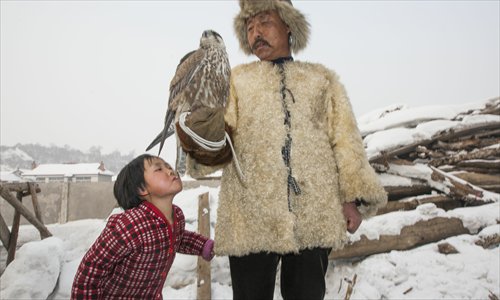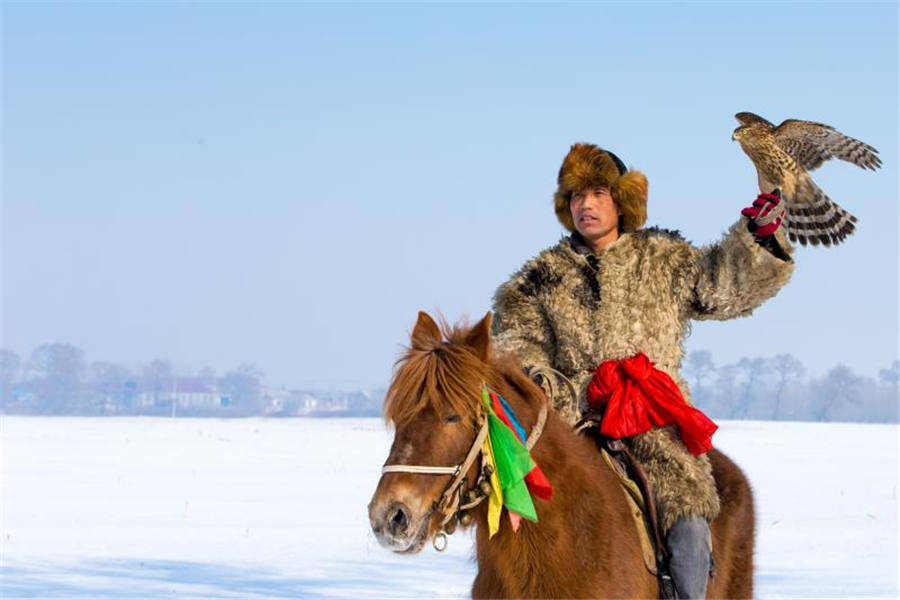
From the People’s Daily app.
This is Story in the Story.
The ancient tradition of hunting with birds, otherwise known as falconry, has been around for almost 6,000 years. It is one of the oldest and yet still active customs practiced anywhere in the world.
In China, falconry’s origins date back to the Shang Dynasty in 2200 BC.
To raise conservation efforts and awareness, six years ago, the International Association for Falconry (IAF) marked November 16th as World Falcon Day.
"Preserving falconry involves maintaining not only the traditional culture that builds practical skills of empathy with animals, but also the conservation of raptors and their prey," said one falconer at a recent Falcon Day celebration.
Falconers in China from Jilin Province to Xinjiang Autonomous Region use falcons, hawks, and eagles to hunt for food, and thanks to their efforts the hunting tradition remains.
Today’s Story in the Story looks at falconry, the sport of hunting with birds, and the ethnic minority groups in China that have preserved the hunting tradition.

A child looks at a trainer holding a falcon in the village of Yingtun in Jilin Province. (Photo: IC)
Haymu, a 70-year-old Kazakh falconer and herder recalls one of the proudest moments of his life. The time he hunted with his eagle in front of a crowd of 10,000 at a winter festival in Qinghe County, in China’s Xinjiang Uygur Autonomous Region.
"Golden eagles are precious. Not everyone can tame them. My uncle passed his bird to me when he became too old for it," he said
"People like the Kazakh tradition of eagle hunting. Some have accused me of animal abuse, but I treat every eagle like family. I think of them more often than I think of my grandsons." he said.
Haymu said January is the best month to train birds, even though it’s the coldest month. When the sun sits high, he wears a fox fur hat, sheepskin coat, and felt boots, traditional falconer attire.
Haymu also trains birds to follow a moving target. An assistant on horseback will drag a fox hide through the snow until the eagle in training finds it.
The birds are kept for four years before they are returned to the wild for mating purposes.
Although Haymu does not rely on falconry for a living, his ultimate goal is to make sure the tradition lives on.
In Qinghe, there are only 40 falconers and 40 eagles, said Tuokun, the 60-year old head of the local falconers' association.
Haymu and Tuokun are concerned they could be the last generation that keeps the tradition alive, at least in their region.
"I have two sons, a driver and a businessman. Neither wants to learn. I am worried that when I die, falconry might die with me," said Tuokun.
Hidden in the forests of Changbai Mountain in Northeastern China’s Jilin Province, in the small village of Yingtun, or “falcon village,” over 300 Manchu families catch hawks and eagles and then train them to be their hunting partners.
Once a form of leisure and entertainment for the Manchu Qing Dynasty in the early 17th century, raising falcons is still considered a show of bravery and manhood by their modern descendants.
Yingtun villagers refer to Liu Hongsheng as the “Falcon King.”

(Photo provided to chinadaily.com.cn)
The 60-year-old started learning how to train accipiter hawks, commonly known as Goshawks, when he was just nine years old.
When taming a newly captured raptor, a master must live with it in isolation and maintain eye contact with the bird several hours each day. Once the bird tires out, it is ready to be trained.
The goshawk, known for its precision and speed, can fly upwards of 40 miles per hour. In one day, it can capture 20 pheasants, which are sold for $25 each at local markets.
Since 2013, Li and his fellow falconers have rescued over 200 injured birds of prey from the mountains. The village has ramped up efforts at not only preserving the hunting tradition, but also the birds in the area and work with local conservation groups.
President of Falconry Culture in Jilin City, Li Wenzhong said, "Traditional falconers used to catch wild raptors and train them as hunters, but our organization is intended to help the birds better adapt to the wild."
The birds are set free every spring when temperatures become warmer, Li explained.
Falconry also provides the village with an added revenue stream as thousands of tourists and professional photographers from all parts of the globe visit annually.
Li supports his work with money from tourist groups who visit his training yard to watch the birds perform. He also trains the falcons to drive wild birds away from airports.
"Many people have doubts over falconry, but I have a clear conscience. We carry on our heritage through better protection of the birds," Li said.
(Produced by Nancy Yan Xu, Lance Crayon, Brian Lowe and Da Hang. Music by: bensound.com. Text from Global Times and China Daily.)


